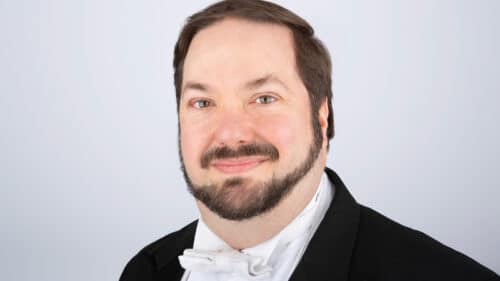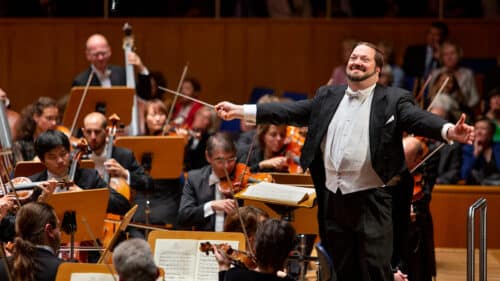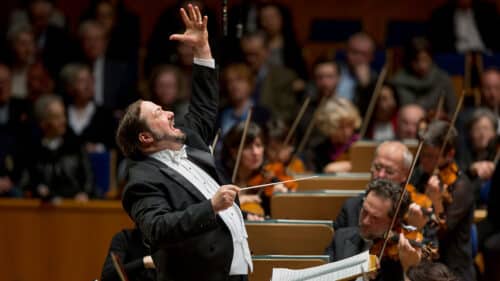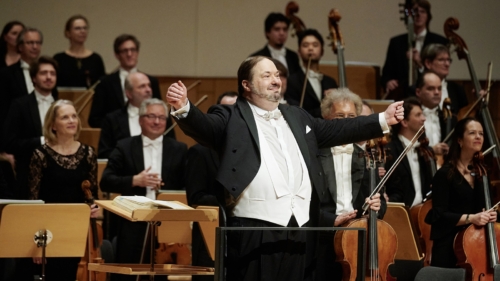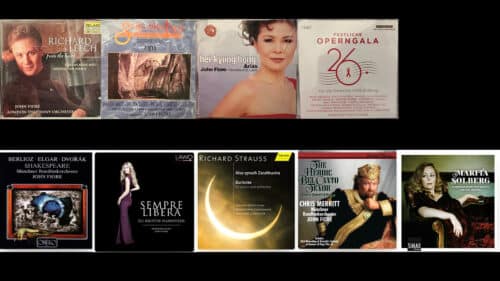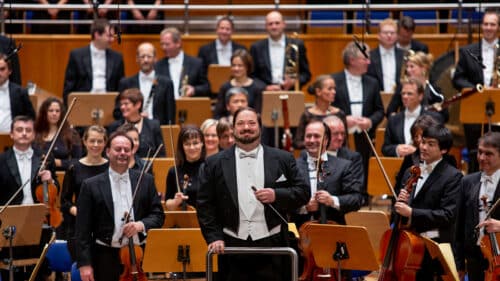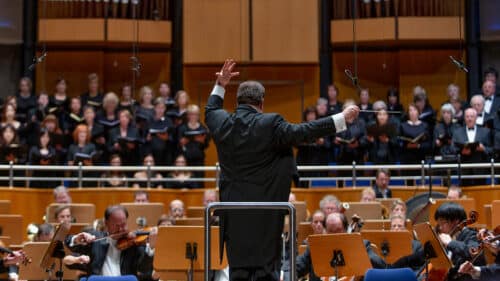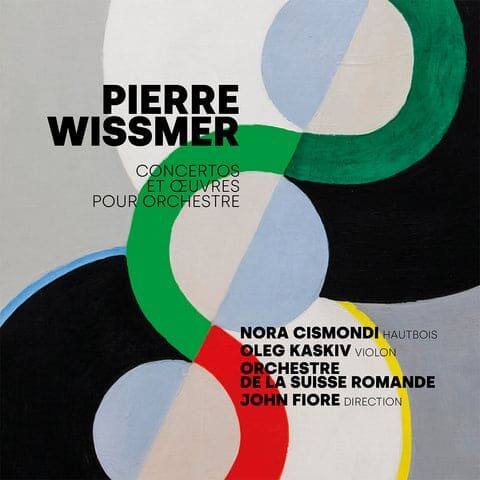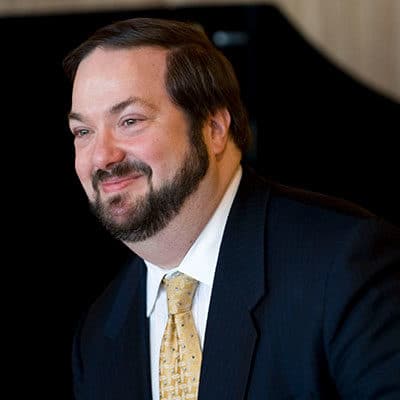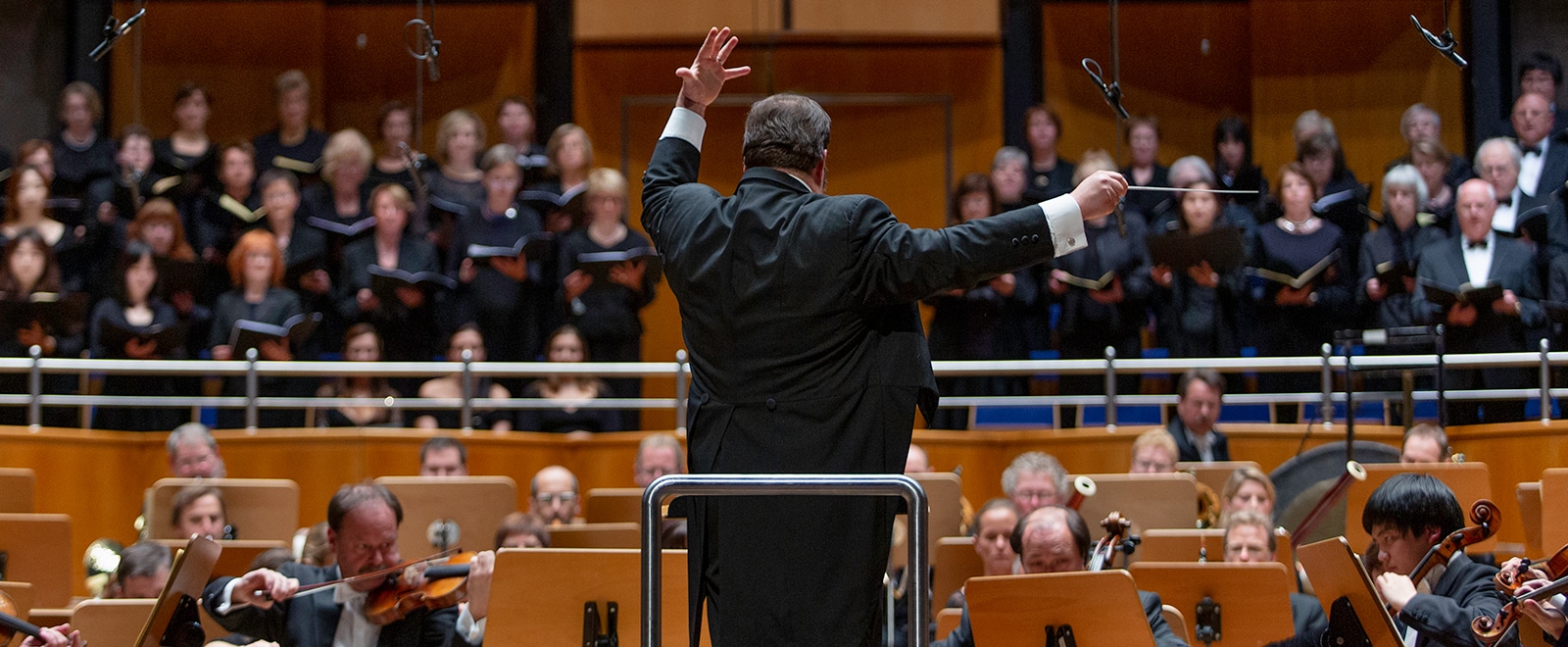
Bachtrack“John Fiore is responsible for the musical direction and demonstrated his distinguished experience in the Italian verismo repertoire; He executed with rigor and mettle the dynamism of the score … Outstanding orchestral performance in the premiere” (Tosca, Gran Teatre del Liceu)
El Periódico de Catalunya“John Fiore supported the singers and provided dynamic and dramatic contrasts, which brought out passionate passages while balancing the decibels at precise moments…the Liceu Symphony followed without reservation and with a great sound, carried along by this music that is all passion.” (Tosca, Gran Teatre del Liceu)
Santa Fe New Mexican“Conductor John Fiore and his orchestra provided dramatic sweep that lets the onstage action maintain long expanses of quietude without any depletion of dramatic energy” (Madama Butterfly, Santa Fe Opera)
Seattle Times“The show’s musical values were in good hands with conductor John Fiore, a native Seattleite who now has a major European career. Pacing the orchestra musicians, supporting the singers and giving Verdi’s timeless melodies their full due, Fiore extracted the maximum drama from the score with an impeccable sense of timing.” (Aida, Seattle Opera)
The Washington Post“conductor John Fiore, especially in the show’s second half, found a compensatory musical momentum, balancing Saint-Saëns’s lushness with dashes of rhythmic point.”
Well-known among the opera houses internationally, JOHN FIORE is prized for his depth of knowledge of a broad operatic repertoire, his sensitive and supportive collaborations with singers and soloists, and for his deft ability to communicate between the stage and pit in the fluid and changing circumstances of live opera performance. A gifted linguist with command of eight languages, he has been a frequent guest of the leading companies throughout Europe, North America, and Australia covering a wide range of repertoire from early classics through contemporary masterpieces.
Mr. Fiore begins the 2024-25 season with an Annilese Miskimmon production of Janacek’s Jenufa at the Royal Swedish Opera in Stockholm, where he will conduct Alban Berg’s Wozzeck later this season. In Germany, John returns to Dresden’s Semperoper, a company he’s been associated with for nearly 30 years, to lead Humperdinck’s Hansel und Gretel, and to the Deutsche Oper Berlin for Wagner’s Der Fliegende Holländer and Tannhäuser.
Over the course of nearly three decades Mr. Fiore has forged long lasting relationships with some of Europe and North America’s great houses: At the Metropolitan Opera, Mr. Fiore has conducted more than 100 performances of a dozen works, including the Met’s premiere production of Dvorak’s Rusalka (1993, revived in 1997), as well as Aida, La traviata, Un ballo in maschera, Madama Butterly, La bohème, Tosca and Carmen. He’s also had longstanding relationships with the Chicago Lyric and San Francisco Operas, and especially with the Santa Fe Opera where he last conducted Tosca in the summer of 2023. Other US companies include the Houston Grand Opera (Tannhäuser) and Washington National Opera (Saint-Saëns’ Samson et Delilah).
Mo. Fiore made his European debut at the Oper der Stadt Köln with Puccini’s Manon Lescaut in 1990 and was invited to return the following season for Carmen and Der Rosenkavalier. In a quick rise, he became a frequent guest to the major repertory houses in Germany, among them the Bayerischer Staatsoper (Un ballo in maschera, Aida, Nabucco, Der Fliegende Holländer, Tosca, and Carmen) as well as Dresden’s Semperoper (Die Walküre, Arabella, Die Entführung aus dem Serail, Nabucco, Aida, La traviata, La Cenerentola, Meyerbeer’s Les Huguenots, and now Hansel und Gretel). More recently, Mr. Fiore has become a frequent and treasured guest of the Deutsche Oper Berlin, including jumping-in to a new production of Puccini’s Il Trittico on three days’ notice, and conducting a wide range of German and Italian repertoire including Turandot, La forza del destino, La Giaconda, and Die Meistersinger von Nürnberg, which was captured for DVD release on Naxos/RBB. In Italy, he has conducted the Rome Opera (La traviata), Teatro San Carlo in Naples (Rusalka), Teatro Carlo Felice in Genova (La bohème, La Giaconda); and in Switzerland at the Zurich Opera (Tristan und Isolde and La traviata), Grand Théatre de Genève (Parsifal, Andrea Chénier, Nabucco), Lausanne Opera (Nabucco), as well as France’s Opera National de Bordeaux (Norma, Otello, Falstaff), and elsewhere. At the Prague National Theatre, Mr. Fiore led the first complete Ring cycle since the Second World War, in addition to Parsifal, Eugene Onegin, and La fanciulla del West.
Known as a master of Italian and German romantic opera, Fiore has also amassed a surprising number of performances of twentieth century masterpieces, among them Berg’s Lulu, Debussy’s Pelléas et Mélisande, and Ligeti’s Le Grand Macabre. In Prague, he led a new Jiri Herman production of Zdeněk Fibich’s opera rarity Pad Arkuna (The Fall of Arkuna), and in Oslo conducted the world premiere of Jüri Reinvere’s Peer Gynt together with a double bill of Hindemith’s Sancta Susanna and Zemlinsky’s Ein Florentine Tragödie. Other world premieres include Bright Sheng’s Madame Mao at the Santa Fe Opera (2003) as well as Christian Jost’s Vipern (2005) and Giorgio Battistelli’s The Fashion (2007) at the Deutsche Oper am Rhein.
Mr. Fiore served as the first music director of the Norwegian Opera in Oslo’s beautiful new opera house designed by renowned Swedish architectural firm Snøhetta. From 2009-2015 he conducted a wide swath of repertoire including groundbreaking productions by Stefan Herheim (Lulu, Salome) in addition to concerts, ballet, the well-regarded Queen Sonia Vocal Competition, and educational presentations. Before Oslo, maestro Fiore was the chief conductor of the Deutsche Oper-am-Rhein – the unique repertory opera company giving performances in two neighboring Rhineland cities of Duisburg and Düsseldorf. He performed an intensive and extensive schedule as he was simultaneously the General Music Director of the cities’ symphonic orchestra, the Düsseldorfer Symphoniker. During his decade in the Rhineland, Mr. Fiore kept a full schedule conducting more than sixty different operas covering German, Italian, French, Russian, and Czech languages, and styles from classical through bel canto to modern and contemporary world premieres. He performed the Wagner Ring cycle on several occasions and took the company to Savonlinna, Finland in 2002. Concurrent with his opera position, he conducted a wide range of symphonic repertoire with the Düsseldorfer Symphoniker, covering such major works as Berlioz’s La Damnation de Faust, and Arnold Schoenberg’s massive Gurrelieder, to name but two.
John Fiore was born in New York City to a musical family, and he received his earliest training at home from his father, a pianist and choral director, and mother, a singer. While he was still young, the family moved to Seattle, where he studied piano, cello and other string instruments, and was already a local musical phenomenon by age 14, so much so that he was engaged by the Seattle Opera as pianist and vocal coach for its annual summer production of Wagner’s Ring. He later attended the Eastman School of Music in Rochester, New York, and in 1981 joined the staff at the Santa Fe Opera where he acquired his affinity for the operas of Richard Strauss. Within a short period of time, he became a prized assistant to the three largest North American companies: New York Metropolitan Opera, Lyric Opera of Chicago, and the San Francisco Opera. In the summer of 1986, he went to Europe to Assist Zubin Mehta in Florence (Die Meistersinger), and then to Bayreuth, assisting Daniel Barenboim on Tristan und Isolde, returning the following two summers for Parsifal, Tristan again, and on the 1988 Harry Kupfer production of The Ring. It was during this period that Mr. Fiore assisted Leonard Bernstein, including the famed/infamous recording of West Side Story. Mo. Fiore made his first solo conducting debut at the San Francisco Opera in 1986 with Gounod’s Faust.
By 1990 Mr. Fiore had begun to conduct symphonic repertoire as well, making debuts on three continents. In the summer of 1996, he jumped-in for Robert Shaw at the Hollywood Bowl in Los Angeles to conduct Verdi’s Requiem and conducted the Boston Symphony, Minnesota Orchestra, Seattle Symphony, Toronto Symphony, and New York Chamber Symphony, to name a few. His European orchestral engagements have included the Dresdner Staatskapelle, Orchester der Deutsche Oper Berlin, Bamberger Symphoniker, Munich Radio Orchestra, Gürzenich Orchester, Orchestre de la Suisse Romande, Accademia Nazionale di Santa Cecilia, Orchestra del Teatro La Fenice, Orchestra del Teatro Comunale di Firenze, Orchestre National de Lyon, Orchestra Philharmonique de Montpellier, Basel Radio Symphony Orchestra among many others.
SEPTEMBER 2024
